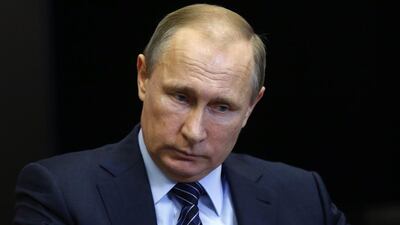Last week, the Russian navy instructed the Lebanese authorities to close off a part of their air space to avoid Russian military drills in the eastern Mediterranean. The peremptory decision provoked anger in Beirut, leading Moscow’s ambassador to say he had not been informed of the decision.
The Russians ended their drills a day earlier than scheduled. However, the incident was revealing with regard to Russia’s greater involvement in the Arab world, coming in the wake of its military deployment in Syria. While the Russian role in the region has grown significantly in recent months, the potential for misunderstandings has grown as well.
That’s not surprising. Lebanon was never particularly close to the former Soviet Union, even if certain Lebanese factions were helped by Moscow during the civil war. One politician, Walid Jumblatt, long an ally of the USSR and the son of a Lenin Prize winner, was among those most critical of Russia’s behaviour.
Lebanon’s humiliation last week was compounded by the fact that the Russian order came on the eve of Lebanese Independence Day, only days after foreign minister Gebran Bassil travelled to Moscow to meet his Russian counterpart, Sergei Lavrov. The two men primarily discussed antiterrorism issues and the on-going void in the Lebanese presidency.
Lebanon is not high in Russia’s priorities, but as Vladimir Putin adjusts his Syria policy, he cannot ignore the mood in neighbouring countries, as the shooting down of a Russian aircraft by Turkey on Tuesday attests. Lebanon’s stability concerns Russia, which is why Mr Lavrov insisted that overspill from Syria would not undermine Lebanese security.
On the separate issue of the presidential vacuum, Russia has taken a more formulaic position, urging the Lebanese to find a solution free from foreign intervention. The Russians have not addressed Lebanon’s deadlock, though some politicians have said Russia opposes Michel Aoun. Mr Aoun wants to be president and has perpetuated the stalemate by refusing to allow his bloc to attend parliamentary sessions that might vote in an alternative.
Whether Russia really does oppose Mr Aoun is unclear, but its position raises a larger issue, namely where the line is drawn between Russia’s influence in Syria and Lebanon, and Iran’s. Even before the start of the conflict in Syria, it was Tehran, through Hizbollah and its close ties with Damascus, that had the major say in Syrian and Lebanese affairs. As the Russian role has increased in recent months, that could change.
Much has been written about the potential for Russian-Iranian divergences over a settlement in Syria, though for now the signs have been limited. Both are upholding Bashar Al Assad’s regime, and Mr Putin’s trip to Tehran on Monday showed no evidence of a rift. However, there are limits to what Russia can do regionally without competing with Tehran, and seeking a decisive say in internal Lebanese political affairs is one of them.
However, Russia can profitably go in other directions in Lebanon. From an ideological perspective, Russia has particular appeal for Christian minorities, and not just those from the Orthodox community. Many Christians, whatever their doubts about Mr Al Assad, fear that an Islamist victory in Syria might victimise the community, and view Russia as a bulwark against this.
That rationale may be simplistic, but has given Russia an aura it did not enjoy previously in the region, where Christians tended to look west. As part of Russian soft power it can be useful in the future, as the existential fears of Arab Christians rise. Financially, Russia may also gain from Lebanon’s potential to become an oil and gas producer.
While in Moscow, Mr Bassil suggested that the two countries could cooperate on this front. Cynics might point to the foreign minister’s personal stake in companies involved in the sector, but Russian companies have shown interest in Lebanon’s offshore reserves.
For now, however, development of the sector is in a hiatus with oil prices at a low and Lebanon having failed to pass two key decrees on licensing and the delineation of blocs. Only a resolution of the political crisis will open the door to passage of the decrees, so Mr Bassil’s optimism may have been premature.
As the United States has disengaged from the Middle East, it has left open spaces for Mr Putin. Russia will face setbacks, not least in Syria, but is now a real regional player, after being marginalised in the period following the end of the Cold War.
Ironically, one thing that may have changed the dynamics is the nuclear deal with Iran. Russia probably worried that American-Iranian rapprochement could be detrimental to its own regional ambitions, by virtue of bestowing on Iran virtual recognition of its agenda. One way for Russia to mitigate this is to open channels to Sunni Arab states and countries such as Lebanon.
That will require a delicate balancing act on Mr Putin’s part. He has managed to sustain this until now by helping Mr Al Assad, preserving ties with Saudi Arabia, and collaborating with Iran. Lebanon will remain an additional test of this paradoxical approach, perhaps in a peripheral but never a trivial way.
Michael Young is opinion editor of The Daily Star in Beirut
On Twitter: @BeirutCalling


